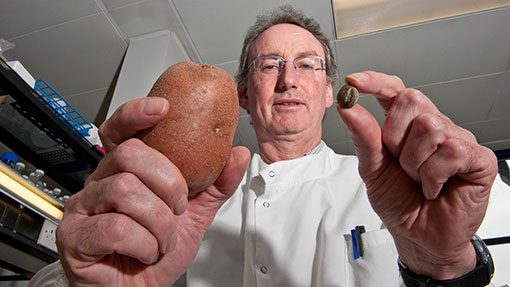GM potatoes tip balance in favour of grower

British scientists have produced a genetically modified potato variety that can stay free from late blight without the use of fungicide sprays.
A three-year project at the Sainsbury Laboratory in Norfolk introduced the late blight resistant gene from a wild potato variety into the commercial variety Desiree.
Because the study was funded with public money the genetics are available for use by any plant breeder that wants to use them under licence. This could pave the way for the genes being introduced to a range of existing varieties and could lead to huge cost savings to the industry.
Late blight costs UK farmers an average of £60m each year which equates to about £500/ha or up to half of all production costs. An average year for blight will require about 10-15 treatments with up to 25 spray times needed in a severe year. Cutting out the fungicide treatments would cut fuel, pesticide use and the soil compaction risk, scientists have said.
See more on genetically modified crops
Jonathan Jones, the Sainsbury Laboratory’s senior scientist, told Farmers Weekly that the new GM variety was very effective in keeping the most important disease threat out of the crop.
“In 2012 there were very high levels of late blight from mid-July onwards, and with no fungicides applied the non-GM Desiree plants were wiped out.
“In contrast, the transgenic plants were fully resistant all the way through to the end of the experiment and gave a tuber yield advantage too,” explained Prof Jones.
The Biotechnological and Biological Sciences Research Council (BBSRC) jointly funded the project with The Gatsby Foundation with the aim of addressing the challenge of building late blight resistance into varieties with consumer and processor appeal.
“We can use this kind of GM technology to tip the evolutionary balance in favour of potatoes and against late blight.”
Professor Jonathan Jones
Prof Jones pointed out that conventional breeding from wild relatives is very slow and by the time a gene is successfully introduced into a cultivated variety, the late blight pathogen may have already overcome the resistance.
“We can use this kind of GM technology to tip the evolutionary balance in favour of potatoes and against late blight,” he added.
Difficulties
The start of the project was delayed in 2010 due to difficulties in gaining permission to conduct the open-air trial.
When the trial was eventually established, dry conditions meant waiting for a blight outbreak, as the trials were not being artificially inoculated with the pathogen.
Prof Jones said: “Infection eventually occurred in a cool and wet period in August and we were looking at two different resistant genes in the first year.
“One of the genes broke down to the late blight population that was blown in, so we narrowed it down to one gene that showed resistance.”
The drought continued into 2011 and conditions weren’t even in favour of the blight pathogen Phytopthora infestans, so little was learned.
But the breakthrough came in the final year, when the wet weather sent blight pressure rocketing in potato crops in many parts of Britain and the modified plants stood up to the test.
Changing mood
The feat had already been achieved by agri-chemical giant BASF, who produced the transgenic blight resistant variety Fortuna.
However, the company withdrew all their potential GM potato varieties in 2012 due to “uncertainty in the regulatory environment and threats of field destructions”.
However, Prof Jones said the mood was shifting in favour of this technology and DEFRA are no longer putting obstacles in the way of GM research.
“Control of late blight in a bad year is extremely difficult, as it usually coincides with a wet conditions and it is difficult to treat crops with fungicides.
“If we can develop commercially acceptable varieties which can almost negate the need for fungicides it will be a fantastic boon for the industry,” said Prof Jones.
| Reaction: Resistant or receiving | |
|---|---|
“Potato Council supports research being carried out into GM crops and any other technology that can potentially provide consumer, economic or environmental benefits. There must be a continuing, fully informed public debate on GM crops and that acceptance should be based informed choice by consumers.” |  |
“This field trial highlights just how far behind GM technology is compared to conventional breeding, with conventional blight resistant varieties commercially available. There is no market for GM potatoes in the UK and growing GM potatoes here could lead contamination in the supply chain, resulting in massive loss of markets for UK farmers.” |
|
“The work at the Sainsbury Laboratory is very exciting and the environmental and consumer benefits could be huge, but an irrational fear of GM produce in Western Europe is robbing us of this technology. If it was legal to grow and the customers accepted these potatoes I would grow them, as long as they had gone through the correct testing and regulatory processes to prove they are safe – just as any pesticide we use does.” |  |


